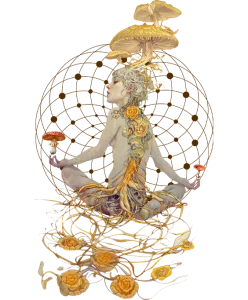Introduction
In recent years, the exploration of psilocybin mushrooms, commonly known as magic mushrooms, has gained significant traction in the field of mental health. Researchers are increasingly recognizing the potential of these psychedelic substances in treating a variety of psychiatric disorders, particularly depression and anxiety. This article delves into how magic mushrooms could help prevent depression and anxiety, highlighting the mechanisms at play and the therapeutic potential of psilocybin-assisted therapy.
The Science Behind Psilocybin
What is Psilocybin?
Psilocybin is a naturally occurring psychedelic compound found in certain species of mushrooms, including Psilocybe cubensis. When ingested, psilocybin is metabolized into psilocin, which interacts with serotonin receptors in the brain, particularly the 5-HT2A receptor. This interaction is believed to induce altered states of consciousness, including changes in perception, mood, and thought processes.
Mechanism of Action
Psilocybin’s interaction with serotonin receptors, especially the 5-HT2A receptor, is crucial for its psychoactive effects. This interaction leads to a temporary disruption of the brain’s default mode network (DMN), which is associated with self-referential thought and rumination. By disrupting the DMN, psilocybin can help individuals break free from negative thought patterns and gain new perspectives on their mental health conditions.
Therapeutic Potential of Magic Mushrooms
Treating Depression
- Effectiveness in Treatment-Resistant Depression: One of the most promising applications of psilocybin is in the treatment of treatment-resistant depression (TRD). Studies have shown that a single dose of psilocybin can lead to significant reductions in depressive symptoms, often with rapid onset and lasting effects. The ability of psilocybin to induce profound changes in consciousness and emotional state makes it a powerful tool in addressing TRD.
- Long-Term Benefits: Beyond immediate symptom relief, psilocybin therapy has been associated with long-term improvements in mood and well-being. Participants in clinical trials have reported sustained reductions in depressive symptoms for weeks or even months after a single treatment session. This enduring effect is believed to result from the lasting changes in brain connectivity and cognitive flexibility induced by psilocybin.
Alleviating Anxiety
- Impact on Anxiety Disorders: Psilocybin has also shown promise in treating various anxiety disorders, including generalized anxiety disorder (GAD) and social anxiety disorder (SAD). The anxiolytic effects of psilocybin are thought to stem from its ability to enhance emotional processing and reduce activity in brain regions associated with fear and anxiety.
- Cancer-Related Anxiety: Psilocybin-assisted therapy has been particularly effective in alleviating anxiety and depression in patients with life-threatening cancer diagnoses. Studies have demonstrated that psilocybin can significantly reduce existential distress, improve quality of life, and promote a sense of peace and acceptance in these patients.
Clinical Studies and Evidence
Groundbreaking Research
Several landmark studies have demonstrated the efficacy of psilocybin in treating depression and anxiety. For instance, a study conducted by Johns Hopkins University found that a single high dose of psilocybin led to substantial and sustained decreases in depression and anxiety in cancer patients. Similarly, research from Imperial College London has shown that psilocybin can effectively reset the brain, leading to improved mental health outcomes.
Longitudinal Studies
Longitudinal studies have further supported the therapeutic potential of psilocybin. These studies track participants over extended periods, providing valuable insights into the long-term effects of psilocybin therapy. Findings indicate that the benefits of psilocybin can persist for months or even years, underscoring its potential as a long-term treatment option for depression and anxiety.
The Role of Psychedelic-Assisted Therapy
Combining Psilocybin with Psychotherapy
Psychedelic-assisted therapy involves the use of psilocybin in conjunction with psychotherapy. This integrated approach enhances the therapeutic process by providing a supportive framework for patients to process their psychedelic experiences. Therapists trained in psychedelic therapy guide patients through preparation, the psychedelic session, and integration, helping them derive meaningful insights and lasting benefits from their experiences.
Therapeutic Settings and Safety
Ensuring a safe and supportive environment is crucial for the success of psychedelic therapy. Clinical settings for psilocybin-assisted therapy are carefully designed to provide comfort and safety, with trained professionals monitoring patients throughout their sessions. This controlled environment minimizes the risk of adverse reactions and maximizes the therapeutic potential of psilocybin.
Addressing Concerns and Misconceptions
Potential Risks and Side Effects
While psilocybin has shown great promise, it is not without potential risks. Some individuals may experience adverse effects, such as anxiety, paranoia, or confusion during their psychedelic experiences. However, these effects are typically short-lived and can be mitigated through proper preparation and support. It is essential for patients to undergo thorough screening and assessment to ensure they are suitable candidates for psilocybin therapy.
Legal and Regulatory Challenges
The legal status of psilocybin remains a significant barrier to its widespread adoption in clinical practice. In many countries, psilocybin is classified as a Schedule I substance, meaning it is considered to have a high potential for abuse and no accepted medical use. However, recent shifts in public opinion and policy changes, such as the decriminalization of psilocybin in certain jurisdictions, are paving the way for more research and therapeutic applications.
Future Directions and Research
Expanding Applications
Future research will likely explore the broader applications of psilocybin in mental health treatment. Potential areas of investigation include its use in treating other psychiatric disorders, such as obsessive-compulsive disorder (OCD), eating disorders, and substance use disorders. Additionally, studies may examine the effectiveness of different dosing protocols and delivery methods to optimize therapeutic outcomes.
Integrating Psilocybin into Standard Care
As evidence supporting the efficacy of psilocybin continues to grow, there is a need to integrate this treatment into standard mental health care. This will require collaboration between researchers, clinicians, and policymakers to develop standardized protocols, training programs for therapists, and regulatory frameworks that ensure patient safety and treatment efficacy.
Conclusion
Magic mushrooms, with their active ingredient psilocybin, hold immense potential in preventing and treating depression and anxiety. The profound and lasting benefits observed in clinical studies underscore the need for continued research and development in this field. By integrating psilocybin-assisted therapy into mainstream mental health care, we can offer new hope to individuals struggling with treatment-resistant depression, anxiety disorders, and other psychiatric conditions. The future of mental health treatment may well lie in the transformative power of psychedelic substances, combined with innovative therapeutic approaches and supportive care.
References
- Carhart-Harris, R. L., & Goodwin, G. M. (2017). The therapeutic potential of psychedelic drugs: past, present, and future. Neuropsychopharmacology, 42(11), 2105-2113.
- Griffiths, R. R., Johnson, M. W., Carducci, M. A., Umbricht, A., Richards, W. A., Richards, B. D., … & Klinedinst, M. A. (2016). Psilocybin produces substantial and sustained decreases in depression and anxiety in patients with life-threatening cancer: A randomized double-blind trial. Journal of Psychopharmacology, 30(12), 1181-1197.
- Ross, S., Bossis, A., Guss, J., Agin-Liebes, G., Malone, T., Cohen, B., … & Schmidt, B. L. (2016). Rapid and sustained symptom reduction following psilocybin treatment for anxiety and depression in patients with life-threatening cancer: a randomized controlled trial. Journal of Psychopharmacology, 30(12), 1165-1180.


